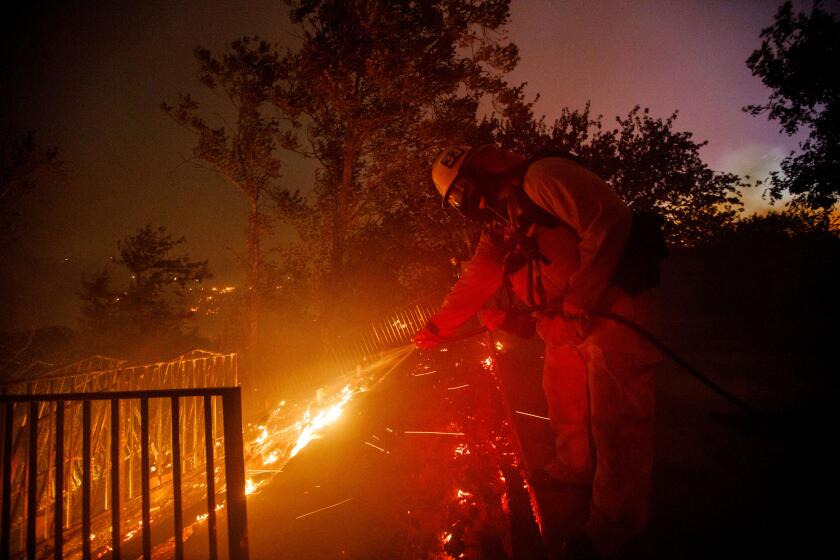President Obama explains the Libya intervention; evaluating teachers; and cellphones in prisons
Focusing on Libya
Re “Obama defends Libya mission,” March 29
I applaud President Obama’s horror over the atrocities in Libya. But what about Darfur? There, according to Make Way Partners, “Women and children are at highest risk of human trafficking, forced prostitution and other forms of modern-day slavery” and “little to no other help is available because it is considered either ‘too’ dangerous, ‘too’ expensive or ‘too’ remote for most people to go.” And what about Congo? Oxfam has reported that sexual violence has become widespread in the eastern part of that country, where the incidence of rape has increased by a factor of 17.
We have not intervened to stop these horrors. Why is Libya more deserving of my tax dollars? Please tell me it’s not oil.
Melanie Savage
Pasadena
The military intervention in Libya has been dubbed a humanitarian mission to protect Libya’s civilian population. And who has put those people in mortal danger? The answer is clear: Moammar Kadafi.
Simple logic demands that if we want to protect civilians, we must eliminate the cause of the danger to civilians. Sorry for saying that, but any other strategy seems like stupid diplomacy.
Aldona Meilutyte
Santa Monica
The nation can rest easy. Our president is a surgeon with a scalpel, not a cowboy with a shotgun.
Obama told us most definitively that yes, we are the most powerful nation in the world, and yes, we will use that power along with other nations when necessary to prevent the occurrence of another Rwanda.
The president gave new meaning to the notion of “never again.” The world and this nation should be grateful.
Frank Ferrone
El Cajon
The United States is out front leading the way with money and equipment to help overthrow a dictator accused of atrocities and terrorism. Our government is willing to wage war against the Libyan people who support their government in favor of those who oppose it.
Regardless of the support American citizens have for the Libyan opposition, each citizen must have the same feeling about Obama’s words and actions as they had for those of George W. Bush. Obama’s speech was practically a copy of Bush’s speeches, if you exchange the words “Iraq” and “Saddam Hussein” for “Libya” and Kadafi.”
Steve Hawes
Sunland
‘Value added’ and teachers
Re “LAUSD tackles a tough formula,” March 28
I find it curious that John Deasy, the L.A. Unified School District’s incoming superintendant, believes “value-added” analysis of teacher effectiveness is preferable to having administrators visit classrooms and observe teachers.
Is there no time for such evaluations? Do the administrators lack the knowledge to be able to sort out good teachers from weak ones?
If this is the case, then our schools are academically leaderless. Who mentors teachers and helps them grow? Who is there to understand teachers’ needs and provide resources and support?
It should be the responsibility of school site administrators to be the academic leaders at their schools. If they are unable to do that, value-added analysis of teachers is meaningless.
Mark Elinson
Los Angeles
The value-added method mathematically quantifies what is essentially a subjective activity. It’s like trying to objectively rate a good piece of literature. On a scale of 10, William Shakespeare may have been rated a 5.5 because his English is difficult to read and the wording is archaic.
Administrative officials will always wind up embarrassing themselves with highly complicated, heavily tweaked formulas that try to quantify the unquantifiable.
Kevin Powell
Long Beach
What you owe, and what you pay
Re “Medical bills need reconstructive surgery,” Business, March 25
David Lazarus could not be more correct. Five years ago, I underwent a cardiac ablation. I was out the same day, but the bill was $82,000. I called my insurer, who told me not to worry because they don’t pay that amount.
The paperwork I received showed payments in the $2,000 range. I am baffled to this day about the difference between a hospital’s “rack rate” and what it actually accepts as payment in full.
As a sidebar to this, my daughter’s husband needed a CAT scan for his back, which he didn’t have insurance for. My daughter shopped around until she found a rate the two of them could afford. Not everyone thinks to do this kind of research, so some are hurt by the high bills in the process.
Donald Graves
Huntington Beach
The reason medical bills are so high is that they are not based on the traditional “job-based costing” concepts used in economics, business and accounting. There is no economic substance to the “pricing” of a medical procedure in America.
The hospital model is warped. It remains in place because no one has to look at the collective inefficiencies of either the hospitals or the insurance companies. Then again, ignorance is sometimes bliss.
What we have here is not a bad foundation but bad mud. The hospital and health insurance communities in America need “new dirt.” Only then will they truly be able to “reap what they sow.”
Stephen A. Bonick
Beverly Hills
Thoughts on the ‘hanging judge’
Re “Second thoughts of a ‘hanging judge,’ ” Opinion, March 25
I salute retired Superior Court Judge Donald McCartin for his honest appraisal of California’s death penalty. Indeed, death is different, and those sentenced to death deserve every right of appeal. But when the appeals stretch out for decades, victims’ families are trapped in a nightmare.
If Gov. Jerry Brown commuted the sentences of the 700-plus death row inmates to life without possibility of parole, victims’ families would finally have resolution. The state would save $1 billion over the next five years.
When critical state services are threatened by budget cuts, we can no longer afford to play the killing game.
Catherine Thiemann
San Diego
I think McCartin may be right about closure having no real meaning to a victim’s family, but I also think that aside from reconciling themselves to the loss, they want justice done.
There is a thin line between justice and revenge, and it is the state’s responsibility to see that the one is carried out to prevent the family from agonizing over the other, with its attendant loss of faith in the state’s justice system.
If we choose to define justice for the crime of murder as being life imprisonment rather than the interminably protracted march to death, we will both serve the desperate need of those left bereaved for justice as well as saving millions better spent on preventing further crimes.
Robert Silver
Los Angeles
Hold this call
Re “Allowing phones in the cells might be a good call,” Column, March 26
Sandy Banks’ idea is terrible. She implies that allowing inmates to have cellphones would give them some “normalcy” in their lives and could save on wages to prison guards.
By this logic, we could save millions by eliminating security screening at airports.
And what is to prevent a prisoner from ordering a “hit” against witnesses who testified against him? Prison is not supposed to resemble “normalcy.” Most prisoners are there because they committed serious crimes. What motivation exists for a criminal to refrain from committing more crimes if he becomes comfortable?
Monique Bryher
Tarzana
More to Read
A cure for the common opinion
Get thought-provoking perspectives with our weekly newsletter.
You may occasionally receive promotional content from the Los Angeles Times.






